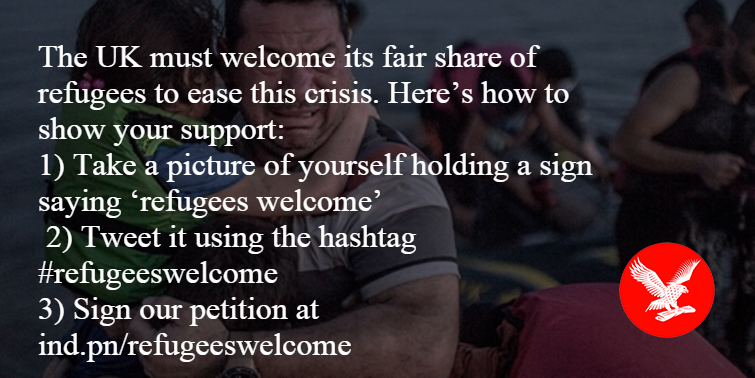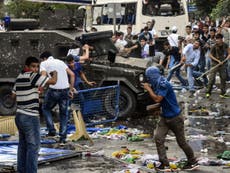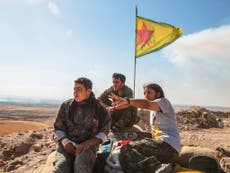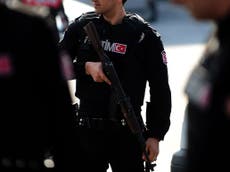Syria's Kurds have little choice but to flee amid the desolution, ruins and danger they face
Their future is full of menaces in the shape of a hostile Turkey to the north and Isis to the south


The Kurdish enclave of Kobani in north-east Syria, once the home of Aylan al-Kurdi and his family, is largely in ruins after a four-and-a-half month siege by Isis fighters that ended in January. It was one of the greatest victories in Kurdish history, but a Pyrrhic one that saw 300,000 Syrian Kurds flee into Turkey from Kobani, a city just south of the Turkish border, and from the 250 villages surrounding it.
Isis may have been driven back, but the Kobani enclave remains a desolate, ruined and very dangerous place. Some 70 per cent of the city was destroyed in the fighting, by Isis suicide bombs and mortars, Kurdish counter-fire, and US air strikes using 500lb and 2,000lb bombs to smash Isis positions. At one point, Isis set fire to buildings in order to create a smokescreen to protect them from US aircraft.
In most of Kobani city there is no water or electricity supply and retreating Isis forces booby-trapped many of the shattered buildings, so these cannot be easily cleared. The fighting was more intense and went on longer than any recent battle in Iraq or Syria, with Isis – which calls itself Islamic State – losing an estimated 2,000 fighters and the Kurdish YPG militia some 560.
After January there was a trickle of Kurdish refugees returning from Turkey to Kobani because life among the ruins was better than in the squalid refugee camps. But the Syrian Kurdish authorities turned out to be tragically over-confident that Isis was incapable of a counter-attack. On 25 June some 100 Isis fighters disguised in YPG uniforms entered Kobani and a village 20km to the south of the city and began a massacre that left between 223 and 233 men, women and children butchered, along with 35 YPG militiamen. Syrian Kurdish refugees in Turkey will have got the message that it is not safe to go home even when their forces are advancing with the help of US air strikes and Isis is retreating.
Kobani is one of three Kurdish enclaves just south of the Turkish border that have created their own quasi-state since the Syrian army withdrew in the summer of 2012. The 2.2 million Syrian Kurds, long discriminated against by the Damascus government, became a surprisingly important player in the Syrian civil war. Their enclaves, which they call cantons, are in strategically valuable places, controlling crossing points on the 550-mile border with Turkey. Half this frontier is now held by the YPG, denying Isis important crossing points between Turkey and Syria.
The Syrian Kurds have a political significance out of proportion to their numbers in the region’s civil wars. They have achieved a real measure of practical independence in the de facto Kurdish state called Rojava under the control of the Democratic Union Party (PYD) and its well-disciplined YPG militia. Since last October, the YPG has been the only effective ground force in Syria co-operating with US airpower against Isis. But the enhanced influence of the Syrian Kurds has made them a target for their many enemies. Turkey has been dismayed at finding what amounts to a Kurdish statelet controlling 250 miles of its southern frontier. Worse, the PYD and the YPG are the Syrian branch of the Kurdistan Workers’ Party (PKK), a powerful guerrilla organisation that has been fighting the Turkish army since 1984.
This summer, Rojava, a fertile wedge of territory full of wheat fields and dotted with oil industry “nodding donkeys”, looked idyllic and peaceful compared with the rest of Syria. But for Syrian Kurds the future is full of menaces in the shape of a hostile Turkey to the north and Isis to the south. Moreover, any potential winner of the civil war in Syria may swiftly move to extinguish the Kurdish independent entity. In the face of these dangers, it is no wonder that Syrian Kurds will take any risk to escape to Europe or anywhere else where they might find safety.





Join our commenting forum
Join thought-provoking conversations, follow other Independent readers and see their replies